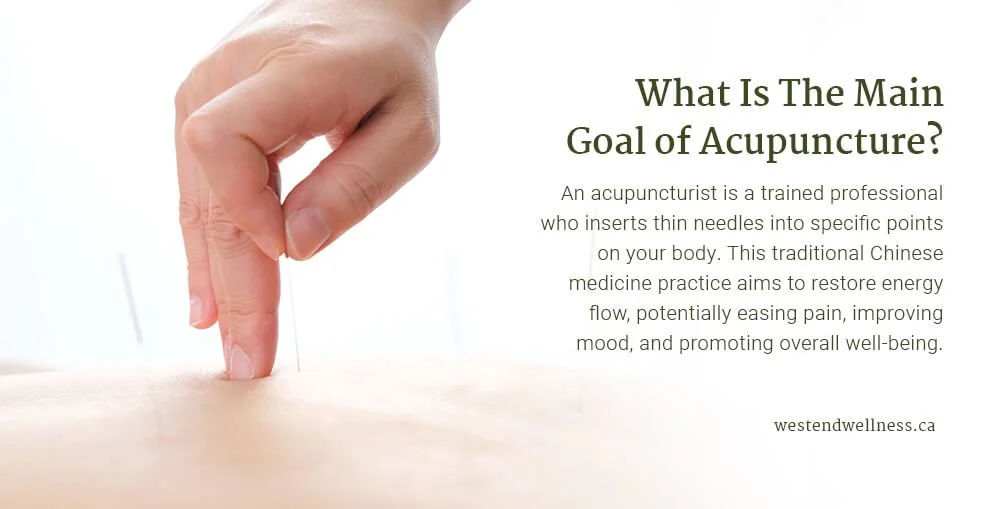The Connection Between Acupuncture and Pain Management
Table of Contents Show
Quick Summary
Discover the transformative power of acupuncture in managing pain and enhancing overall well-being.
We talk about the ancient practice of acupuncture, unravelling its scientific basis, the types of pain it can address, and its role within a broader pain management strategy. Learn about the mechanisms through which acupuncture offers relief, from endorphin release to improved blood circulation, and explore how it can complement conventional treatments.
Pain, a pervasive health issue that affects countless individuals worldwide, often disrupts daily life and diminishes quality of life.
In the heart of Vancouver, at West End Wellness, we turn to the ancient wisdom of traditional Chinese medicine, particularly acupuncture, to address this universal challenge.
Acupuncture, a practice refined over thousands of years, offers not just relief but a pathway to understand and manage pain differently.
This article aims to explore the deep connection between acupuncture and pain management, shedding light on how this traditional method can offer effective solutions for those seeking respite from chronic pain.
So even if you're here to understand something new or are unfortunate and dealing with pain management, we hope to help you or your loved ones find the relief you've been seeking.
We will be talking about the benefits and mechanisms behind acupuncture's role in pain management and how it can help you or your loved ones find it right here in the vibrant city of Vancouver.
Understanding Acupuncture
At the core of acupuncture is the theory of meridians and qi (chi), which are fundamental to traditional Chinese medicine.
Meridians are invisible pathways in the body through which qi, or life energy, flows.
This energy is responsible for our overall health and well-being. When the flow of qi is blocked or unbalanced, it can lead to physical and emotional health issues, including pain.
Acupuncturists are trained professionals who use acupuncture to help balance the flow of qi in the body. In Canada, including our vibrant Vancouver, acupuncturists undergo rigorous training and certification to ensure they can safely and effectively administer treatment.
They use thin, sterile needles inserted at specific points along the meridians to unblock or influence the energy flow and help the body's natural healing process.
The acupuncture treatment process is both an art and a science.
After a detailed assessment of a client's condition and discussing their health goals, the acupuncturist selects specific acupuncture points for needle insertion.
The needles are usually left in place for 20 to 30 minutes. During this time, clients may experience a sense of deep relaxation or a mild tingling sensation, indicating qi activation.
If we were to give a good example that we commonly see at West End Wellness, it would be those who suffer from chronic tension headaches.
Traditional treatments provided minimal relief, and the condition significantly impacted their daily life.
So after a series of acupuncture sessions focusing on specific meridians related to stress and head pain, clients have reported a substantial decrease in the frequency and intensity of their headaches, showcasing the transformative potential of acupuncture in pain management.
This is just one of many success stories that highlight the efficacy of acupuncture in addressing not just the symptoms but the root causes of pain, offering a holistic path to healing and well-being.
If you're looking for an alternative treatment for chronic pain that is safe and natural, then why not learn about Myofascial Release Therapy?
Pain Management with Acupuncture
Acupuncture, a practice with roots in ancient Chinese medicine, has garnered recognition in the modern medical community for its pain-relieving capabilities.
At its core, acupuncture's ability to alleviate pain hinges on several scientifically backed mechanisms, making it a valuable tool for those seeking alternative or complementary pain management strategies.
The Science Behind Acupuncture's Effectiveness
Endorphin Release: One of the key factors in acupuncture's pain relief capabilities is its ability to stimulate the release of endorphins, the body's natural painkillers. These chemicals, produced by the brain and nervous system, are crucial in blocking pain signals and promoting a sense of well-being.
Modulation of Nervous System Activity: Acupuncture is thought to modulate the activity of the nervous system, specifically affecting areas involved in pain sensation and processing. This modulation can help reduce the intensity of pain signals transmitted throughout the body.
Improved Blood Circulation: The insertion of acupuncture needles is also believed to improve blood circulation. Enhanced circulation can facilitate the healing process in injured tissues and reduce inflammation, contributing further to pain reduction.
Types of Pain Acupuncture Can Help Manage
Acupuncture has been shown to be effective in managing various types of pain, including:
Neck Pain: Acupuncture can help reduce pain and stiffness in the neck, promoting better mobility.
Muscle Pain and Cramps: Acupuncture may help relax muscles and ease pain caused by tension or spasms.
Osteoporosis: Studies suggest acupuncture may help manage chronic pain associated with osteoporosis.
Dental Pain: Acupuncture may offer relief after dental surgery or procedures.
Fibromyalgia: Acupuncture can be a complementary therapy for fibromyalgia, potentially reducing pain and improving sleep quality.
Neuropathy: Acupuncture shows promise in managing pain caused by nerve damage, such as neuropathy from diabetes.
It's important to remember that acupuncture is not a one-size-fits-all solution, and what works for one person may not have the same effect for another.
At West End Wellness, we recommend that if you're considering acupuncture for pain management, you consult a licensed acupuncturist to discuss your needs and expectations.
Supporting Evidence
Research evidence supports the efficacy of acupuncture for pain management, although it's important to note limitations, such as the variability in study designs and the placebo effect.
However, a significant body of research, including studies published in reputable medical journals, indicates that acupuncture can indeed provide measurable pain relief across various conditions. For more detailed insights, here's a link to a study exploring acupuncture's effects on chronic pain.
When it comes to our own experience, another common case we have seen with our beloved Vancouver residents is those struggling with persistent lower back pain.
Traditional pain management methods offered little relief, and the impact on their daily life was profound. After a series of acupuncture treatments focused on specific pain points, the client reported a noticeable improvement in pain levels, enhanced mobility, and an overall better quality of life.
We have seen those dealing with mobility issues who have tried various treatments to respond well to acupuncture.
Acupuncture offers a promising avenue for those grappling with chronic pain, providing a blend of ancient wisdom and modern scientific understanding.
While it may not be a universal remedy for all, its potential in pain management is undeniable, backed by research and real-world success stories.
Acupuncture needles are extremely thin, sterile, and inserted into specific points to relieve pain.
Complementing Acupuncture with Other Pain Management Techniques
Acupuncture stands as a cornerstone within the mosaic of pain management, offering a holistic approach that can seamlessly integrate with broader strategies for alleviating discomfort.
At West End Wellness in Vancouver, we advocate for a comprehensive approach to pain management that combines traditional and modern therapies.
Integrating Acupuncture into a Holistic Pain Management Plan
Acupuncture’s effectiveness is amplified when combined with a suite of complementary practices. These include:
Lifestyle Changes: Simple adjustments in daily habits, such as incorporating anti-inflammatory foods into your diet or establishing a consistent sleep routine, can significantly bolster the pain-relieving effects of acupuncture.
Physical Therapy: Physical therapy exercises designed to strengthen muscle groups surrounding the affected area can enhance stability, mobility, and pain relief, creating a synergistic effect with acupuncture treatments.
Mindfulness and Stress Reduction: Techniques such as meditation and deep-breathing exercises can help manage the psychological aspects of chronic pain, reducing stress levels and potentially increasing the effectiveness of acupuncture.
Conventional Pain Management Approaches
While acupuncture offers a holistic alternative, it does not negate the value of conventional pain management methods. Medications and physical therapy remain foundational elements in treating various pain conditions. However, these approaches sometimes come with limitations, such as side effects from medication or the physical toll of intensive therapy.
Advantages of Integrating Acupuncture
Incorporating acupuncture into your pain management strategy offers several distinct advantages:
Fewer Side Effects: Unlike many pharmaceutical treatments, acupuncture is associated with minimal side effects, making it a safer option for long-term pain management.
Holistic Approach: Acupuncture treats pain not as an isolated symptom but as part of the body’s overall energy flow, encouraging a state of balance and well-being that extends beyond mere symptom relief.
Complementary to Conventional Treatments: Far from being an either/or choice, acupuncture can be used in conjunction with conventional treatments, potentially enhancing outcomes and offering a more comprehensive approach to pain management.
The Synergy of Acupuncture with Other Treatments
The philosophy behind acupuncture is balance and harmony, principles that apply to the body and our healthcare approach.
Embracing acupuncture alongside other pain management techniques reflects a commitment to exploring all avenues of relief, ensuring that individuals have access to a multifaceted, personalized plan for managing their pain.
This integrative approach, championed by wellness centers like West End Wellness, acknowledges pain's complexity and the need for diverse strategies to address it. It promises a more effective, nuanced, and compassionate approach to pain management.
Acupuncture stimulates endorphins, reducing pain by blocking the brain's perception of discomfort.
Considering Acupuncture for Pain
Our acupuncturists believe and are dedicated to showing those considering acupuncture for pain management as an alternative to medicines.
However, determining if it's the right approach for you is the most important part of any treatment. Several factors should be considered when evaluating one's circumstances. These come down to understanding how to select a qualified practitioner and being aware of the potential risks and side effects.
Factors to Consider
Type of Pain: Acupuncture has been shown to be particularly effective for chronic pain conditions such as lower back pain, arthritis, and headaches. Reflect on the nature of your pain and consult with healthcare professionals to assess if acupuncture could be beneficial for your specific situation.
Medical History: Your overall health and medical history can influence the effectiveness of acupuncture. Conditions such as bleeding disorders or being on blood thinners may necessitate additional precautions.
Finding a Qualified Acupuncturist
The success of acupuncture treatment greatly depends on the acupuncturist's skill and knowledge.
In Vancouver and beyond, look for practitioners licensed by a recognized body, such as the College of Traditional Chinese Medicine Practitioners and Acupuncturists of British Columbia (CTCMA).
These professionals have undergone extensive training and adhere to strict standards of practice, ensuring that you receive safe and competent care.
Potential Risks and Side Effects
While acupuncture is considered safe when performed by a qualified practitioner, it's essential to be informed about potential risks and side effects, which are generally minimal.
These can include soreness at the needle sites, minor bleeding, or bruising. In very rare cases, improper needle placement can lead to more severe complications.
However, the risk of these adverse effects is significantly reduced when you choose a certified and experienced acupuncturist.
Research shows acupuncture improves chronic pain, including back pain, arthritis, and headaches.
FAQ
Is acupuncture an effective pain management tool?
Acupuncture shows promise as a chronic pain management tool. Research suggests it can help, especially for back, neck, and knee pain. It likely works by stimulating the nervous system to release endorphins, your body's natural painkillers. While not a magic bullet, it can be a valuable addition to your pain management plan. Talk to your doctor to see if it's right for you.
How long does acupuncture take to work for chronic pain?
Acupuncture can help with chronic pain, but it's not a one-time fix. It might take weeks or even months of regular sessions to feel a difference. Be patient and stick with your acupuncturist's plan. If you don't see improvement after a few weeks, talk to them – they might need to adjust your treatment.
How many acupuncture sessions will I need?
The number of sessions depends on the severity and type of pain. Your acupuncturist will create a personalized treatment plan based on your needs.
What is the downside of acupuncture?
Acupuncture is generally safe with minimal downsides, but here are a few things to consider:
Limited Effectiveness: It might not work for everyone and may require multiple sessions.
Potential Discomfort: You might feel a slight prick or ache during insertion while the needles are thin.
Infection Risk: Choosing a qualified acupuncturist who uses sterile needles is crucial to minimize infection risk.
Conclusion
In this exploration of acupuncture as a pain management method, we've uncovered the foundational principles behind its effectiveness, examined how it complements other pain management strategies, and provided guidance for those considering acupuncture as part of their healing journey.
Understanding its roots in traditional Chinese medicine and recognizing the scientific mechanisms that contribute to its success in treating pain, acupuncture is a compelling option for those seeking relief.
We hope you have been able to take away a few good points, but if you are to leave with something, here are some important points to remember:
Acupuncture can stimulate the release of endorphins, modulate nervous system activity, and improve blood circulation, contributing to its pain-relieving effects.
It's effective for various types of pain, including headaches, back pain, and arthritis, and research supports its use.
Finding a qualified and experienced acupuncturist ensures safe and effective treatment.
As you navigate the path toward managing pain, consider acupuncture not just as an alternative but as a holistic complement to your overall strategy.
At West End Wellness, we're committed to guiding you through this journey, offering a blend of traditional wisdom and modern care.
Embrace the potential of acupuncture to unlock a more comfortable, balanced life, free from the constraints of chronic pain.
If you have any further doubts or questions regarding this subject or another treatment, contact one of our experienced Acupuncturists or Registered Massage Therapists here at West End Wellness Clinic. You can either give us a call or make an appointment.
Disclaimer: Please remember this article is for informational purposes only and should not replace professional medical advice. Please consult a healthcare provider or someone with the correct qualifications before starting any new exercise or treatment program.





